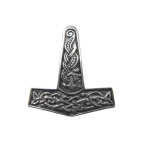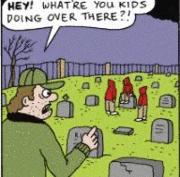|
Oh yeah, destructible terrain obstacles and such is gonna be a big part of the encounter. And those are great ideas, Dire Penguin  Thanks a ton for all the help guys! I'm still open to any other ideas of course. Thanks a ton for all the help guys! I'm still open to any other ideas of course. 
|
|
|
|

|
| # ? May 9, 2024 12:03 |
|
I would like to give my players a town. It would be a small village that is pretty much on it's last legs when the PCs show up. I want them to have the option of building it up as a home base. (Side Note: they are currently low-level demon hunters in a land recently run over by demons.) My question is how should I go about doing this mechanically in 4e DND. I was planning on having the towns people ask the PCs to do quests for them, something related to the PCs other adventures. "Oh your going to the Ice Wastes? Well I hear there is a forgotten mage library up there..." Based on how many quests they do they would get town money to buy Lair Items from AV2 for the town. That is what I am currently thinking at least. My original idea was to give them Town Points to spend buffing up different parts of the town, like Library, or Militia. I liked that because it forced them to debate and agree on HOW to spend the points. I could never figure out a goo system for giving them out however. I'm wondering if anyone has any sort of advice on a better way to do this, or feed back on the idea I outlined here.
|
|
|
|
Make it more direct. Each quest and action taken should improve the city accordingly: Help the librarian to restore the towns plundered library and research will be easier in the city and maybe more scholars and other similar NPCs will come to the town. Clear the fields and woods around the city from lesser demons and their demonic sources and increase the food supply this way. This leads to a healthier and larger population that might even be more happy. Help the right political groups in the town for a better organized social structure and thus higher security and force projection into the hinterland. This might result in a small armed force to support the group in their endeavours. Secure trade routes to increase the flow of goods which leads to more varied and higher level items that can be bought. Help the priests of the destroyed temples to raise funds for rebuilding them. This will result in a weakening of the demons influence on the minds of the population. Edit: Each part of the town that can be improved should have at least 3 quests in a chain. Think about branching for some of the parts. This will make the town feel more like the creation of the group. Make lots of branching purely cosmetic. Those are cheap to do. But don't neglect to insert a few important decisions that will have real consequences. (Examples: the political system of the city, which deity is worshipped the most, relations to neighboring regions, establishment of guilds.) Hungry Gerbil fucked around with this message at 14:11 on Aug 2, 2010 |
|
|
|
Son of Thunderbeast posted:Yeah, those were also two major problems I foresaw. And honestly I have no solution to the first one without serious railroading (like, "he seems way too powerful to attack head-on, are you sure?"). First off, are the main damage-dealers in your party ranged attackers? If so, then you're basically set: have some NPCs with the party who charge in, and try to melee it. Roll the dice very visibly for its attacks on them so that your PCs can see that it's hideously good in melee combat. If your party's main strikers are melee fighters then it's a bit trickier because the players' standard instinct will be to let the strikers get up close. My advice then is to drop the mechanic where the PCs have to chip away at its health, go with Dire Penguin's mechanic of it throwing minions who slow the PCs down if they're ignored, and make sure that the PCs know that it's much stronger while it's in the tomb (maybe sunlight weakens it, or something). You still get the chase scene with fighting in it, they're just not fighting the main boss during it. I've just had a third idea occur to me. When the lieutenant teleports out, he leaves his mooks behind. Have the lieutenant's mooks all flee the zombie-beast as well as the PCs, except for maybe a couple who charge in and get munched as a warning to the players that this thing's out of their league. The mooks and the PCs are both fleeing from the zombie-beast and fighting each other at the same time (since the mooks have figured that they don't need to outrun the zombie if they can take the PCs down and let it munch on them...)
|
|
|
|
Oh yeah, having enemy minions flee the big zombie is a great way to make it seem scary. Also, if you have melee guys feel free to make enemies show up in front of the party, that way they can charge them to move faster and clear the way for their ranged allies.
|
|
|
|
Hello all, brand new DM. I'll probably be abusing this thread every so often for advice! Going to cross-post my tiny scenario from the 4ED thread, as I'm still in quote:I wanted to DM the game and I had an absolute blast doing it. It was very light on the rules as we were all still very very new to a lot of things, but I basically had my guys start out in a bar whose kitchen got raided by Kobolds who had smashed down the back wall to steal supplies. The Innkeeper offered them 1 month free room and board to take care of it and our Paladin rolled a verrrrrry nice diplomacy roll while he the Innkeeper was having arrows fly over his head which bumped it up to 2 months. I had them roll some skill checks to pass from one side of the room over the hail of arrows that was coming over the counter from the kitchen to get to the kitchen entrance and while most of them took the sensible option to sneak under the counter, our Wizard decided he was having none of that peasant nonsense and magic handed the dinner platter their meal came on as cover to run past and was promptly shot in the shoulder for 5 points of damage as he rolled a 1. I'm going to get my group to break their chops on Keep on the Shadowfell as we're all still relatively new to D&D. It'll give us all a chance for us to grow into our individual roles and for my group to learn the characters and start roleplaying a bit, but with the added benefit for myself of not needing to concentrate on creating the world around them and I can really learn the rules inside and out. Afterwards I want to start them on a campaign of my own design. The VERY rough outline for the the end-game I want to set up is basically a kids dreams coming to life. An old-god is doing it to drain their power or whatever. Throughout the campaign they'll come across traditional fairy-tales come to life, but I'm very much going to try and hide that fact from them for as long as possible. Not EVERY scenario I lead them on will be fairy-tale related, but it's probably going to be my major theme. For example the first scenario I'm going to flesh out is basically a spin on the Pied Piper of Hamelin. My group is sent to figure out what shipments from a mining town have stopped coming through. One brave person in the town that hints at an outsider pulling the strings and stealing the workers to depths of the mine for nefarious purposes, noone else dares to speak out about what's going on, but it's implied that the townsfolk murders the poor chap out of fear of being whisked away themselves. This leads to that and they end up in a tomb with rat swarms everywhere and the occasional kobold/gnome/halfling thrown about. Lot of skeletons on the ground that they'll assume are from the kobolds or whatever, but in actual fact are the bones of the children from the town. Deeper down they'll come across mindless thugs/zombies/something that eventually lead to an insane bard that has been gradually mind controlling more and more people from the town. The mindless thugs are in actual fact the townsfolk who had come to kill the bard for stealing their children away. Very rough and will need a lot of fleshing out, but I'm going to have fun with it. I'm going to be really really subtle about it and I hope they don't figure out what I've been doing until the 4th-5th fairy-tale encounter, or if I'm really lucky they won't figure it out at all until the very end during the grand reveal. Another quick example is Goldilocks. Instead of 3 porridges, there'll be a big cave system. A frozen lake, deeper down a hot spring that is juuuust right and deeper down a pit of magma that leads nowhere. Subtle stuff that follows the outline of the fairy-tales, but tries and hide that fact as much as possible. So yeah, anyone know of a crazy old-god that can manipulate dreams? 
|
|
|
|
|
Infinitum posted:I'm going to get my group to break their chops on Keep on the Shadowfell as we're all still relatively new to D&D. It'll give us all a chance for us to grow into our individual roles and for my group to learn the characters and start roleplaying a bit, but with the added benefit for myself of not needing to concentrate on creating the world around them and I can really learn the rules inside and out. The rest of your stuff sounds interesting, but I'd really recommend against Keep on the Shadowfell. It's not very well done, the fights aren't particularly balanced or interesting - they vary intensely in difficulty and you fight many of the same monsters encounter to encounter to encounter and it gets very tedious very soon. There are some other modules that are pretty good from around the same level that are better done. The Eberron one is pretty good, although it takes some work to make it fit any other campaign setting. I haven't done any of the FR modules firsthand, but I hear their pretty good and take almost no work to fit into any other cosmology. quote:So yeah, anyone know of a crazy old-god that can manipulate dreams? As for that, Hypnos was the Greek god of dreams and a bit of a dick, Mask from FR would do that kind of stuff to hide some other plot, any aberration god would benefit from the madness - especially if they're using it to lure people's children to the underdark/some other are where they can be grabbed for slaves. Otherwise, just make one up - some god from so long ago that it's been all but forgotten, a god that needs no direct faith because he represents dreams, wants, desires, etc... TheAnomaly fucked around with this message at 02:07 on Aug 3, 2010 |
|
|
|
Infinitum posted:I'm still deciding if I should punish my group by revealing that the Innkeeper was secretly trying to poison everyone that night with the food and they had just killed their would-be drunken saviors or something else to that extent Infinitum posted:Throughout the campaign they'll come across traditional fairy-tales come to life, but I'm very much going to try and hide that fact from them for as long as possible. Not EVERY scenario I lead them on will be fairy-tale related, but it's probably going to be my major theme. http://www.tv.com/supernatural/bedtime-stories/episode/1138359/recap.html?tag=episode_recap;recap TheAnomaly posted:The rest of your stuff sounds interesting, but I'd really recommend against Keep on the Shadowfell.
|
|
|
|
I hear Slaying Stone is supposed to be pretty good (just came out last monthish?), and it's a level one adventure. Pretty open-ended, too. You're looking for the eponymous artifact, and all you know is that it's in a ruined city, so the party searches the place trying to find it. It's much smaller in scope than Keep, as well. KotS is 1-4, Slaying Stone is only supposed to take you to about level 2.
|
|
|
|
I don't know if this is in the right place, but how do you select characters for your game? I'm starting a 4E game here on the forums, and right now I want to take everybody. What makes for a balanced party? How do I select between wizard A and wizard B, when they both have solid backgrounds?
|
|
|
|
Infinitum posted:I was quite sad that my poor Kobold champion who had survived the whole encounter without a single point of damage done to him until he was the only survivor left was boiled alive before he could tell the group his next bit of information. I don't quite get what you mean here. Are you saying you want to punish them for killing your Kobold champion too easily? Because efficiently killing things that are attacking you is sort of what being an adventurer is all about.
|
|
|
|
I'm going to stick up for KotS and say it's a decent way to ease into the game for a group that doesn't know the rules at all and isn't familiar with roleplaying games. However, it is absolutely true that the battles can get tedious very quickly and the monsters are all the same for large portions of it. My suggestion is to grab a few individual encounters and use them as a starting point, and you can definitely get some use out of the maps. As a new DM I really needed an example to see how encounters were structured, how terrain and enemies combined to make for interesting battles. Tweak and rearrange them as much as you're comfortable with, and always focus on what makes the game fun for your group, whatever that may be. That includes modifying or even sacrificing your awesome narrative if the players aren't buying into it.
|
|
|
|
Green DM here as well. I've got 5 sessions under my belt and things are going smoothly and the players love it so far. I have a few questions, one more technical than the others and probably easier to answer so we'll start with that. What's the best way to go about traps as far as design, execution, and detection goes? There doesn't seem to be any traps in the Adventure Tools, and while I read the section in the DM Guide 1, I'm still a bit fuzzy on how I can give my players a chance of becoming aware of traps and avoiding them. As it is, I've improvised in that if a player interacts with object A and is standing in area B, then the trap involving A and B goes off and I roll an attack and see if it hits. I do try and give them warning ("you see some holes in the wall opposite of the only door.") and wait and see if they use a perception check (I gave them an obvious trap, but there were other traps in the room that weren't so blatant.). I'm also confused with how passive perception interacts with traps. Player passive perception isn't going to change much over time, so when I design a trap, according to my understanding of the RAW, I'm predetermining whether they recognize the trap or not (which I guess would sometimes make sense with crappy traps that are poorly put together). Also it would usually be the same character every time since she's the only one statted in wisdom. How can I go about using traps in a meaningful way that would give the scenario both a solid chance of success and a solid chance of failure?
|
|
|
|
Tomero_the_Great posted:Green DM here as well. I've got 5 sessions under my belt and things are going smoothly and the players love it so far. I have a few questions, one more technical than the others and probably easier to answer so we'll start with that. Don't use traps alone, that is boring. Traps should be used to spice up encounters, rather than replace them. Have a trap that creates a jet of fire across a couple squares, and have enemies and PCs avoid or knock each other into it, for example.
|
|
|
|
Piell posted:Don't use traps alone, that is boring. Traps should be used to spice up encounters, rather than replace them. Have a trap that creates a jet of fire across a couple squares, and have enemies and PCs avoid or knock each other into it, for example. Unless of course you go for a puzzle trap. The success of that depends on your players' preferences. Actually, a couple of basic stand alone traps in the hallways or whatnot can make the party rogue feel good about himself, but if no one in the group has thievery, they're just a demoralizing inconvenience.
|
|
|
|
Chainsawdomy posted:Unless of course you go for a puzzle trap. The success of that depends on your players' preferences. Keep in mind too, If a thief has to search EVERY 5 FOOT SQUARE and be sure they got everything, that's going to take a load of time the best thing I always thought to do is simply roll a hidden 1d20+class level (or whatever) check for a "This area seems like it might have traps", that way the players aren't explicitly told that there are traps and have a roll for it, but likewise they don't waste 3 days searching a 50 foot hall that you didn't put any traps or run straight through a 20 foot corridor that the players wouldn't expect to have traps, but I haven't seen that in experience so take that as it is
|
|
|
|
Piell posted:Don't use traps alone, that is boring. Traps should be used to spice up encounters, rather than replace them. Have a trap that creates a jet of fire across a couple squares, and have enemies and PCs avoid or knock each other into it, for example. Both listen to and ignore this man. Pit traps, poison dart traps, flame jet traps are blah blah blah boring as encounters by themselves. Sophisticated traps that can be attacked, stunned, dazed, stalled and otherwise have powers used on them as the players try to figure out how to avoid/bypass/turn off the drat thing can be a great deal of fun. They should attack multiple squares, have points where attacks are initiated from, and have multiple - synchronized components. I did a trap that was triggered by attempting to steal a large gem from the center of a statues forehead in the middle of a room. The doors closed, and on the first round several scythe traps in the walls went off, attacking the three adjacent squares to their point of origin. These triggered every odd turn from that point on. On Turn 2 stalactites fell from the roof onto the squares directly beneath them, burst 1 aoe attack vs. AC and the terrain became difficult. On turn four a poison gas attack came from the statue, burst 3 vs. fort., and happened every odd turn after that. The way to stop the trap was simply to place something of appropriate size in the back in the hole the gem came from, or batter down the doors and leave. My party chose the latter.
|
|
|
|
TheAnomaly posted:
That's some Indiana Jones poo poo right there.
|
|
|
|
My first-ever campaign as GM will hopefully kick off sometime this week, standard medieval fantasy D&D 4E fare. I plan to mostly play combat by ear and learn what works as I go, but there's one encounter in store a few sessions down the line I know I'll need help planning. It'll rip a few pages out of Far Cry 2's book for an early-game climax: With very little time to prepare, the PCs will be warned to hurry to either of two nearby towns in order to help mount a defense against impending surprise attacks. Both towns have NPCs in them who are helpful to the party, and the idea is to make the incentive to defend either about equal; there's no plot armor, however, and if a town gets overrun, its residents die. If the party agrees to go to the same town or to flee, great. If they choose to split up between the two, though, I have the scenario I'll need help with. What I figured I'd do was have one half of the split party ultimately lose their fight, and give the characters from the losing mini-sessions detailing their narrow escapes from death (starting from regaining consciousness), a bit of plot exposition, and eventual reunion with the party. I'm looking for ways I could accomplish all this without the encounter seeming overly railroady. Do I houserule away death, send in a neverending stream of enemies, focus-fire the loser PCs into unconsciousness all on the same turn, what? What are some good GM tricks for a situation like this?
|
|
|
|
It seems pretty lame that half your party is doomed to inevitable failure because they chose the wrong one of two arbitrary towns to defend.
|
|
|
|
tomanton posted:If the party agrees to go to the same town or to flee, great. If they choose to split up between the two, though, I have the scenario I'll need help with. What I figured I'd do was have one half of the split party ultimately lose their fight, and give the characters from the losing mini-sessions detailing their narrow escapes from death (starting from regaining consciousness), a bit of plot exposition, and eventual reunion with the party. I'm looking for ways I could accomplish all this without the encounter seeming overly railroady. Do I houserule away death, send in a neverending stream of enemies, focus-fire the loser PCs into unconsciousness all on the same turn, what? What are some good GM tricks for a situation like this? Have your PC's fighting at the front with a large group of allies. As PC's take damage, have them notice allies falling. Once they're down to about half their health/resources, have the allies sound a general retreat to the second wall. Have the commander of the allied forces ask the PC's to lead the non-combat capable citizens out a secret or back way and try to make their way to town #2 to warn them of the impending loss - it gets your PC's out of the town before it's actual fall, and burdens them a little, but it won't feel like they failed because of arbitrary town choice. It also leaves plot hooks to lead the players back to the ruins and see who survived.
|
|
|
|
TheAnomaly posted:useful suggestions Thanks, I'll definitely try and work some of this in. Let me elaborate a bit, as this "arbitrary town failure" impression everyone has wasn't what I had in mind. Their unwinnable fight doesn't come from picking the wrong location, it comes from deciding to split up the party to try and defend both (they will receive advance, explicit in-character warning that this is a bad idea). My original plan for this scenario was that once the minority split of the 5-man party were all incapacitated (or the majority, if their rolls were awful enough), both combats would fade to black and I'd narrate that it took all night but the other group eventually fought the baddies off. Why prolong the combat if half the players are sitting it out? Focus would then turn on what happened to the losers. As a matter of fact, one of them would come to in a secret passage with a few NPC buddies and be informed that while their defenses got overrun, the party's efforts allowed the handful of them to get to safety. Another member would find themselves stranded in the woods after being mistaken for dead and falling off a corpse cart headed for a mass grave. Etcetera. Each would get some special plot revelations (small bonus for the big risk), a bit of spotlight time and then be put on track to rejoining the main group. So again, what I want help with are ways to make the scenario as convincing/suspenseful as possible. I'm not going to kill or spite characters for taking the heroic route, but at the same time I don't feel like two very long and drawn-out combat scenes, particularly after warning the party that splitting up is unwise.
|
|
|
|
Why are you forcing one group to lose the fight? Just run the original fights (or a somewhat weakened version.) that you had planned for each section originally. If everyone in one group goes down, have them be capture and run through their escape.
|
|
|
|
Yeah, I agree, best to run the fight against both groups, but at full force, yet time it so that one group can see it's a lost cause and hopefully get away to reinforce the other before all is lost.
|
|
|
|
I've got a question that I haven't seen an answer to come up yet in this thread. Recently I finished a multi-year campaign with two of my players. We played 3e for the longest time and I converted it to 4e. They just finished the "heroic" tier of the campaign that tied up all the previous loose ends while making some new paragon-level ones. I'm also using this as a chance to add in 3 new players to the campaign. The setting for the paragon leg of the campaign is going to be mainly a reflavored/modified version of the game Demon's Souls for anyone who has played it. I'm having trouble with a mechanic though. I will be the first to admit is I am bad at killing players. I just don't have the heart to take away a character someone is enjoying so much. So while my players don't really have to worry about character death, it also takes away some of the challenge. One of the mechanics I'm stealing from Demon's Souls is that players can go into a soul form if they die. So it would be a sort of respawn mechanic to keep the explanation brief. At the end of every adventure or potentially a rare occurrence during one, the players might have a chance to gain their normal body form back. I like the idea because this way I can still keep the potential character death without really getting someone down over a lost character or messing up any plot junk. The part I'm having trouble with is coming up with what a character loses when they are in soul form. I know for sure I will have certain special monsters that only appear if the party has soul form characters in it. But apart from that I can't think of any good penalties to give to the soul form characters. I want the penalties to be things that make them not want to be in soul form, but not bad enough to gimp them or take away fun. I originally thought of things like lower max health, attack penalties or even less available powers to use but all of those just seem to gimp a character. My best idea so far I think is the loss of action points for those in soul forms. Flavor it as not having your actual body keeps you from performing those extra feats of strength. I plan on having a non-combat mechanic as well. Where the longer they are in soul form, they start to lose their entire grip on sanity so I could throw in sanity effects at that player maybe during combat or exploring. Any ideas would be really helpful. I've got the entire setting and campaign backbone hammered out. My players are all really excited from what I've told them about it. I just really want to get this mechanic to work well in a fun way.
|
|
|
|
The whole 'soul form' notion is a pretty interesting one, so I'm just going to throw out a few ideas to kick off conversation. Really though, anything that makes them not want to be in soul form is going to be reducing their effectiveness, so these ideas are all 'gimping a character'. the challenge is to make it fun -- stuff is harder to do or less effective, but thematically in-flavor and offering an interestingly different array of choices. - Reverse substantiality -- a player in Soul Form is insubstantial, but any insubstantial creatures may ignore that quality and the player ignores the insubstantial quality on any other creatures. In a nod to the fun kind of Gygaxian Naturalism, a universe where this happens to adventurers is one where it might happen to monsters, too, so I can see a good chunk of opponents being insubstantial, making this a bit of an advantage under those circumstances but still annoying enough that being alive is a better deal. - The Effort of Power -- HP in Soul Form represents a character's force of will and tenacity to stick around. As such, using an encounter power inflicts 2 damage, dailies 4. Depending on how bookkeeping-intensive you want to get, you could recalculate a soul form's HP based on Cha instead of Con to represent force of personality instead of bodily hardiness, but that might be too fiddly. This would make some classes significantly different in durability depending on whether they're alive or a ghost. - Going Sessile -- for an extra layer of protection, when a Soul Form player is killed, they can attach themselves to an alive player and feed off their vitality. The character is out of play, but not dead -- can be revived by whatever methods you've got in the campaign, basically an extended spiritual hibernation. You can make this cost a surge from the alive player if you want, to represent giving up some vitality to form a protective soul-cyst, if you want. That would depend on the lethality of your campaign setting and how well your party manages surges, I imagine. To help the player still feel connected to the session, you can let their character stay awake enough to communicate telepathically with the host, so even if they can't fight, they can still be in the mix, or even grant some very minor buff to the host during combat. For insanity effects, I strongly suggest you read a copy of Trail of Cthulhu, because there are some seriously nifty ideas in there.
|
|
|
|
How close to the real Demon's Souls do you want to be? For those who don't know the game, the major effects of soul form are: - half hit points (3/4 with an easy to get magic ring); - improved stealth (ghosts don't have footsteps); - no death penalty (dying in body form makes the game harder); - you can't be attacked in PvP as a soul. An interesting dynamic is that it is easy to go from body to soul, but hard to go from soul to body. It works in the game, but you probably don't want your players thinking "well, we need to sneak through the castle now, so let's cut our own throats for stealth bonuses and resurrect ourselves later." Don't be afraid to add all sorts of penalties to soul form; you're already giving your players a huge bonus by letting them keep going after they die. One thing I'd consider is upping the overall deadliness level of the game, and then saying that character death in soul form is permanent. You'll have that safety net of a soul when you start out, but if you get killed you'll be very nervous until you can get your body back. That's the opposite of how Demon's Souls works (the more dangerous the area, the better off you are in soul form) but it might work better for a tabletop game.
|
|
|
|
one logical, negative, effect of dying and losing your body would be your gear. as an insubstantial soul, the Fighter can't use his weapons, the Wizard can't pick up his spellbook, the Thief can't hold a lockpick etc. if you did go for some penalties in soul form, you could explain them that way.
|
|
|
|
bezel posted:How close to the real Demon's Souls do you want to be? I'm mainly just using the flavor and concept of the soul form and less the game mechanics with it. I'm going to try and stay away from giving them any benefits to being in soul form (like the silent footsteps.) I don't really want to give the rogue an excuse to off himself once so he can run around silently. Plot-wise, one of the players will find a mcguffin in the beginning of the campaign. It will affix itself to the character and act as a sort of conduit that is the reason the players can return in a soul form. Whenever someone is in soul form, it could tax that one character. All my players are friends and team players so they'd try and avoid hurting an ally. This could provide incentive for them to try and avoid being in soul form. I am definitely going to enjoy the mechanic because it means I can be a little more liberal with dangerous encounters. I had just recently bought a cthulhu core rulebook for my friend so he can learn to dm and then almost immediately borrowed it so I could read about the sanity stuff.
|
|
|
|
Okay, so, I'm going to be taking up a long term game writing project. I'm thinking something easy that I'm familiar with, D&D 3.5. However, I've becoming increasingly bored with yawn worthy dungeon crawls and a complete lack of permanency in previous campaigns run by other people. So I want to write the game with two things in mind: First, I want to run it out of a specific location. Where doesn't actually really matter as long as I have the source material or failing that, time to make it up. I'm looking for something with source material of a city with 50k+ to run something reaching up to about level ten. Days will go by, seasons will come and go, festivals will go on and can be looked forward to, people come to market and travel, characters can make use of craft skills and you can get to know your local neighborhood/city. And with enough places to take them outside of it when I'm looking for a change of scenery before bringing them back. Second, I want to get away from dungeon crawls. I've never been a big fan of them. And while I'll partake now and again I much prefer people using their heads instead of going from room to room killing whatever is inside robotically, which is excruciating to design and to run. So I was thinking of something along the lines of being more receptive to players, having a sort of wanted board for non-story missions so they can choose what sorts of missions they'd like. So in order to get away from dungeon crawls I've been designing missions along the lines of seafaring, exploration, investigative work, running security, etc. But I'm trying to rack my brains for other stuff and I'm coming up with nothing else. In other words I'm looking for some detailed source material either online or in book form so I can run an entire campaign out of it and I'm also looking for rough ideas on some alternatives to dungeon crawls because they bore the hell out of me. Any suggestions?
|
|
|
|
Ice Phisherman posted:In other words I'm looking for some detailed source material either online or in book form so I can run an entire campaign out of it and I'm also looking for rough ideas on some alternatives to dungeon crawls because they bore the hell out of me. Any suggestions? If you're going D&D (Philistine!) without dungeon crawls, go Dark Sun. I believe a 4e supplement just got released for it, and I think (?) there's a 3 or 3.5 for it. Your players will have enough problems just surviving, without worrying about ancient treasure in a vast tomb. I played it in 2E, and it's something else.
|
|
|
|
Geekkake posted:If you're going D&D (Philistine!) without dungeon crawls, go Dark Sun. I believe a 4e supplement just got released for it, and I think (?) there's a 3 or 3.5 for it. Your players will have enough problems just surviving, without worrying about ancient treasure in a vast tomb. No official 3.x supplement for Dark Sun, sadly, although there was a fan based work in progress floating around for a while. Dark Sun is still mostly combat, though - it's like high fantasy meets Mad Max. You could try Ravenloft, just stick with the core books and ignore ALL supplements. White Wolf is responsible for them; the core book and DM screen (comes with the supplement that actually lists the important characters, like leaders of the towns and domains) are basically reprints with updated rules from second edition. Ravenloft is all about out-thinking your opponents, or at least figuring out exactly what they are, how they operate, and how to effectively take them down before engaging in out and out combat. It's a horror setting, though, and that's all worked into the mechanics. Eberron is really pulpy, so you can at least get out of the dungeon. It's also great for either spy games or Indiana Jones type stuff, plus it has electric-elemental powered trains and sky pirates. EDIT: While I don't particularly care for Pathfinder, I have heard amazing things about the Kingmaker module series from Paizo. You might want to give it a read and see if you like it. If you have a favorite setting, or don't want to buy new books, pulp tends to work fairly well. Go watch Sin City to get a feel for the idea, or even better read/watch the 1930's detective dime novels or the movies they spawned. The Maltese Falcon with crossbows instead of guns and nobles instead of mobsters would be excellent, even in 3.5. Make absolutely sure you talk to your players and they all want to play in a game that's not as combative as they're used to or the girl or guy who makes a combat monkey will try to turn everything into a fight just so s/he can have a moment to shine.
|
|
|
|
Run it in NWoD.
|
|
|
|
What's everyone's opinion on PC deaths? Do you let the dice be god, and if they snuff it, they snuff it? Do you protect them totally? Personally, I feel like an earlier poster did, in that I hate the idea of just taking away a character that a player's invested a lot of time and care into. However, I don't mind killing them if it feels appropriate... I guess my general rule is that if I happen to roll in a way that would kill a player, I fudge it so that they don't die (but come close), unless it happens during a crucial battle, or adds drama/excitement/etc. in some way. Way I see it, if Tochtli the level 10 Tiefling Warlord makes unlucky rolls and dies because a gnoll critically kicks him shin, that poo poo is lame as hell. But if he dies bloodied, screaming his war cry as he charges Gottfried the wicked Necromancer, surrounded by an army of undead that has been tearing at him, then that could be an acceptable death. Even better if what they do directly benefits the party in some way, martyring them. This assumes no resurrections for whatever reason, of course (my game doesn't have resurrections available, at least not normal ones, and they're incredibly hard to get)
|
|
|
|
Son of Thunderbeast posted:This assumes no resurrections for whatever reason, of course (my game doesn't have resurrections available, at least not normal ones, and they're incredibly hard to get)   Sometimes dead is better! Sometimes dead is better!It depends on the game. Tomorrow our "Iron Man, gently caress You PCs" D&D4 game is making a return, and the dice are all that matters. Monsters go for coup de graces and everything. I absolutely wouldn't want like 50% of the people I game with to be in this game, but the group we've assembled knows the score and is ready to rock and roll. I personally love letting the dice rule, but I understand that a lot of people aren't as chill as I am (not that that's a bad thing) and hate losing their mans, so a "softer touch" kind of game doesn't bother me in the slightest. Although in Dark Heresy/RT/DW/WHFRP, where you have Fate Points specifically for that purpose and the game is pretty explicitly murderous, no punches should ever be pulled regardless of players.
|
|
|
|
Well, I'd generally pull punches early on, especially if I overestimated player capabilities in planning. On a more dramatic note, I favor being knocked out and bleeding out as the fight progresses over flat out death(until PCs can reverse it easily), it gives more tension than "Hes dead, round up the diamonds for raise dead", if hes dying, but not quite dead(partly due to the prospect of not having to arrange a raising). On the fights level, suit it to the encounter in question. Wild mindless monsters generally attack the nearest aggressive creature. Most creatures go for disabling rather than coup de grace, but an assassin might stop to finish one guy off before getting the hell out.
|
|
|
|
So, I had a weird idea about interaction skills in general in RPGs, and I was wondering what other GMs thought about it. The two-sided lame scenario is as follows: Scenario A- 1. Player makes awesome appeal to NPC on reasoned, insightful, and logical grounds. 2. Player rolls dice, gets crap. 3. Appeal fails by the book. Scenario B- 1. Player says, "I talk to the NPC. My diplomacy is 39.." 2. Player rolls dice, gets awesomeness. 3. Player sits there, arms folded, without continuing because well, he got 39+awesome, what else does he need to do? Obviously the real solution to Scenario B is "Don't play with someone that lame" but I was thinking that maybe instead of Speech->Roll, it should be Roll->Discussion. Instead of having a (Modified by effective talking) roll produce the outcome, let the roll give the player hints and insights into what they should say if they want to get their way. For example: "Your Diplomacy tells you he's an honorable man. Appealing to his sense of duty will work- questioning if he has ulterior motives will probably offend him", or "Your trainingin Intimdation tells you that actual physical pain will probably make him clam up and wait for his friends- a more subtle threat will be more effective." This cushions the effect of interaction skill rolls, still gives people some feedback on a good or bad roll, and even helps the quiet player who still wants to play a charismatic one, by giving them prompts to work off of. Thoughts?
|
|
|
|
Son of Thunderbeast posted:What's everyone's opinion on PC deaths? Talk to your players. Have a discussion wit the specifically about PC death. We did this in the vampire game I never run. We all agreed that PCs could die at any time if the player opted in - if the player wanted to be involved in politics and scheming and killing other vampires, they were fair game too. So three of my players are actively scheming to kill individual PCs. Their resources they bought with XP have semi-protection, and they are refunded if say their ghouls die or whatever. In my irl 4e game, resurrections were no big thing but everyone also had a stable of characters to pick from. In another, abandoned 4e game dead PCs could be revived through quests and the player of the dead PC could create a temporary character until that happened. There's not really an objectively right answer here. Ask the players what they want, figure out what you want, find some acceptable middle ground
|
|
|
|
Mad Fnorder posted:So, I had a weird idea about interaction skills in general in RPGs, and I was wondering what other GMs thought about it. Also, some players might be pouty if the skill they've invested feats and powers to excel at only gets them a partial success, one where they have to "fill in the blank" This would be an extreme bad case of what you describe. I still prefer it to "I rolled a 34, he's my bitch"
|
|
|
|

|
| # ? May 9, 2024 12:03 |
|
Mad Fnorder posted:So, I had a weird idea about interaction skills in general in RPGs, and I was wondering what other GMs thought about it. I find it interesting that this discussion only seems to arise for social skills. Let's try it with puzzle-solving skills instead: Scenario A- 1. Player solves the quadratic equation in his head in 0.5 seconds. 2. Player rolls dice, gets crap (because his character is likely not as smart as the player's barbarian character). 3. Solution fails because the character (but not the player) is as dumb as a plank, and wouldn't be able to solve this. Scenario B- 1. Player says, "I examine the equation. My Solve Equations skill is +39" 2. Player rolls dice, gets awesomeness. 3. Player sits there, arms folded, without thinking about solving the equation himself, because well, he got 39+awesome, what else does he need to do? It's not great either way, but it kind of sucks if you let the player who has the skills apply those skills to their (unskilled) character, especially if someone else has put character resources into having those skills in-character. You don't ask someone to karate-chop a stack of boards before their character can kick down a door, do you? With that said, involving your players more in roleplaying their actions is a good thing, but the system needs to be consistent. If you've invested in (SkillA), you should be able to perform (SkillA), not play a game of persuading the GM that your (SkillA) check works. Not every player wants to get involved in the roleplaying side of things. Some want to use games as a way of succeeding at things they normall couldn't, like breaking down doors, being charming and suave, or even solving equations. UrbanLabyrinth fucked around with this message at 00:48 on Aug 13, 2010 |
|
|



































